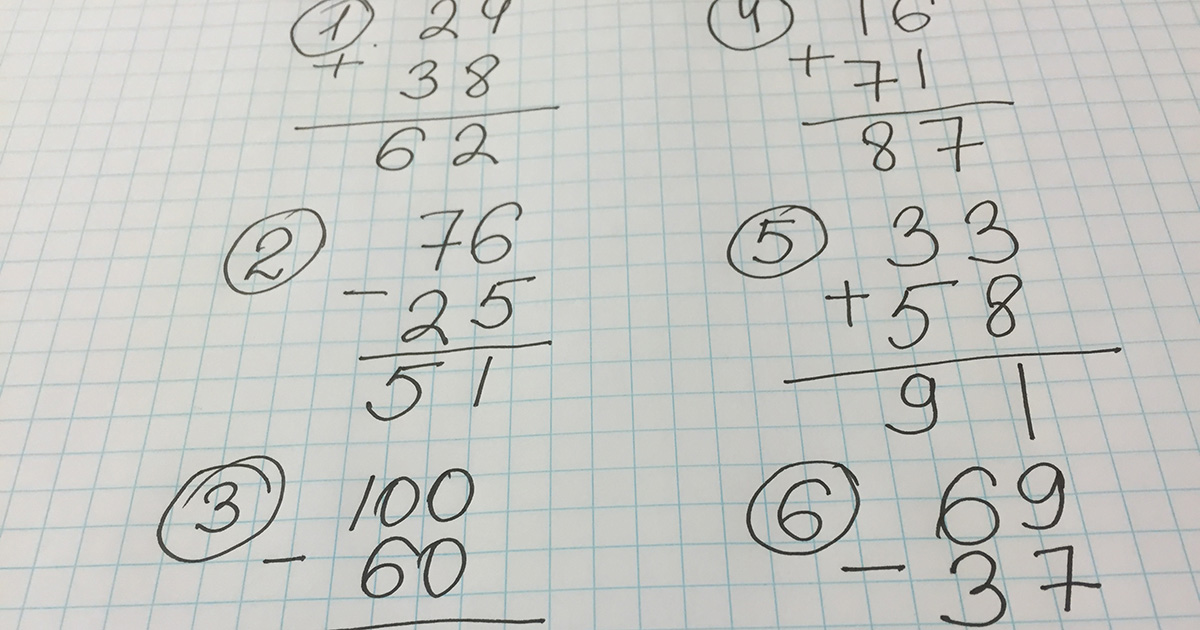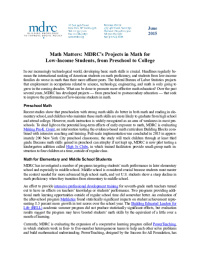Math Matters
MDRC’s Projects in Math for Low-Income Students, from Preschool to College

In our increasingly technological world, developing basic math skills is crucial. Headlines regularly bemoan the international ranking of American students on math proficiency, and students from low-income families do worse in math than their more affluent peers. The federal Bureau of Labor Statistics projects that employment in occupations related to science, technology, engineering, and math is only going to grow in the coming decades. What can be done to promote more effective math education? Over the past several years, MDRC has developed projects — from preschool to postsecondary education — that seek to improve the performance of low-income students in math.
Preschool Math
Recent studies show that preschoolers with strong math skills do better in both math and reading in elementary school, and children who maintain these math skills are more likely to graduate from high school and attend college. However, math instruction is widely recognized as an area of weakness in most preschools. To shed light on the potential long-term effects of early exposure to math, MDRC is evaluating Making Pre-K Count, an intervention testing the evidence-based math curriculum Building Blocks combined with intensive coaching and training. Full-scale implementation was concluded in 2015 in approximately 200 New York City preschool classrooms; the study will track children through at least third grade. Because math skills gained in preschool can atrophy if not kept up, MDRC is now pilot testing a kindergarten addition called High 5s Clubs, in which trained facilitators provide small-group math instruction to four children at a time, outside of regular class.
Math for Elementary and Middle School Students
MDRC has investigated a number of programs targeting students’ math performance in later elementary school and especially in middle school. Middle school is considered crucial because students must master the context needed for more advanced high school math, and yet U.S. students show a steep decline in math proficiency when they transition from elementary to middle school.
An effort to provide intensive professional development training for seventh-grade math teachers turned out to have no effects on teachers’ knowledge or students’ performance. Two programs providing additional math learning opportunities outside of regular school time did somewhat better. An evaluation of the after-school program Mathletics found statistically significant impacts on student achievement representing 8.5 percent more growth in test scores over the school year. The Building Educated Leaders for Life (BELL) academic summer program did not produce statistically significant effects, but evaluation results suggest the program may have boosted students’ math skills by the equivalent of a little over a month of learning.
Currently, MDRC is evaluating the expansion of a cooperative learning program called PowerTeaching, in which students work in four- to five-member heterogeneous teams to help each other solve problems and build mathematical understanding. PowerTeaching, designed by the Success for All Foundation, has shown promising results in small-scale tests, and MDRC is now conducting a school-level random assignment study involving 50 middle schools. Impact results should be available in 2016 or 2017.
Math in Community Colleges
At the college level, MDRC has been evaluating programs largely designed to help students who require developmental (or remedial) math courses. Fifty percent to 70 percent of community college students are required to take such math courses when they enroll, and only 20 percent of them ever successfully complete a college-level math course. Since math is often a requirement for graduation, this represents a major stumbling block.
In 2010, Hillsborough Community College in Tampa, Florida, worked with MDRC to create the Mathematics Access Performance Scholarship (MAPS) program. MAPS gives low-income students referred to developmental math an incentive to take their math courses early and consecutively, get help in an on-campus math lab, and strive for passing grades or better, in exchange for a modest scholarship contingent on performance. MDRC found that MAPS did help move students further along in the math course sequence, and MAPS students also accumulated more credits overall.
MDRC has also evaluated a mentoring program for developmental and college-level math students at South Texas College in McAllen. Beacon Mentoring had no effect on the rate the full sample of students passed their math classes, although it did prevent students from dropping math and seemed to have greater effects for part-time students and students enrolled in developmental math.
Other major evaluations are in the works. The Developmental Education Acceleration Project, for example, is testing the effectiveness of two “acceleration” reforms that aim to speed students through developmental math sequences. The first, ModMath at Tarrant County College in Fort Worth, Texas, divides three semesters of developmental math into nine modules, allowing students to start at a point appropriate to their skills. Results from the randomized evaluation should be released in 2017. The second reform — once MDRC finds a college to test it — will condense a 16-week course into two 8-week courses, allowing students to complete two levels of math in a single semester.
Finally, the New Mathways Project is testing a shift in the content of math courses. Most college-level math courses today emphasize algebra rather than the quantitative literacy and statistics skills required in most professions. The New Mathways Project replaces algebra with math sequences aligned with the requirements of different career paths: Statistical Reasoning for students in social sciences; Quantitative Reasoning for students in humanities or general liberal arts; and algebra-based skills for students in science, technology, engineering, and mathematics. An early report analyzes the implementation of the program at 9 of the first 20 Texas community colleges to adopt it. (Ultimately the new curricula will be used at 50 Texas community colleges.) A random assignment study will be conducted at 4 to 6 colleges under the auspices of the Center for the Analysis of Postsecondary Readiness, a partnership led by MDRC and the Community College Research Center.







